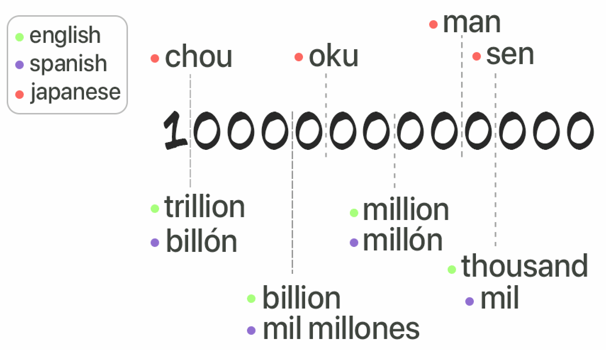Counting System Across Cultures


Understanding the counting system in different languages is crucial for interpreting financial information across cultures. While numbers may seem universal, there can be significant differences in the way they are expressed in languages such as English, Spanish, and Japanese.
In English, the counting system progresses with thousand, million, billion, and trillion, adding three zeros at each step. Conversely, the Spanish system can create confusion, as one billion is referred to as "a thousand million" (mil millones), and a trillion becomes a billion (billón). This results in a numerical false cognate for the word "billion", which represents two distinct numerical values in English and Spanish but are pronounced and spelled similarly.
1 billion = 1,000,000,000
1 billón = 1,000,000,000,000
Meanwhile, the Japanese counting system is quite unique, too. Instead of following the Western pattern, the Japanese system jumps by four zeros from “man” to “oku” to “chou”. For example, large numbers above 100,000 are counted in increments of “man”, while those above 100,000,000 in increments of “oku”.
10,000: ichi-man 「1万」
100,000: juu-man 「10万」
1,000,000: hyaku-man (one million) 「100万」
10,000,000: issen-man 「1000万」
100,000,000: ichi-oku 「1億」
1,000,000,000: juu-oku ( one-billion) 「10億」
10,000,000,000: hyaku-oku 「100億」
Being aware of these cultural differences in counting systems and financial reporting is crucial for navigating financial reporting in different cultural contexts.